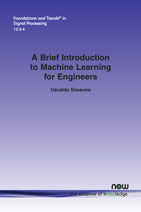A Brief Introduction to Machine Learning for Engineers
By Osvaldo Simeone, King’s College London, UK, osvaldo.simeone@kcl.ac.uk
Abstract
This monograph aims at providing an introduction to key concepts, algorithms, and theoretical results in machine learning. The treatment concentrates on probabilistic models for supervised and unsupervised learning problems. It introduces fundamental concepts and algorithms by building on first principles, while also exposing the reader to more advanced topics with extensive pointers to the literature, within a unified notation and mathematical framework. The material is organized according to clearly defined categories, such as discriminative and generative models, frequentist and Bayesian approaches, exact and approximate inference, as well as directed and undirected models. This monograph is meant as an entry point for researchers with an engineering background in probability and linear algebra.
A Brief Introduction to Machine Learning for Engineers
There is a wealth of literature and books available to engineers starting to understand what machine learning is and how it can be used in their everyday work. This presents the problem of where the engineer should start. The answer is often “for a general, but slightly outdated introduction, read this book; for a detailed survey of methods based on probabilistic models, check this reference; to learn about statistical learning, this text is useful” and so on. This monograph provides the starting point to the literature that every engineer new to machine learning needs. It offers a basic and compact reference that describes key ideas and principles in simple terms and within a unified treatment, encompassing recent developments and pointers to the literature for further study.
A Brief Introduction to Machine Learning for Engineers is the entry point to machine learning for students, practitioners, and researchers with an engineering background in probability and linear algebra.
